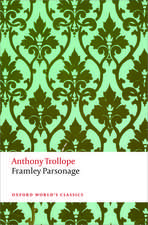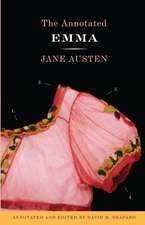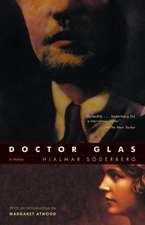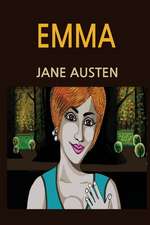The Annotated Northanger Abbey
Autor Jane Austen, David M. Shaparden Limba Engleză Paperback – 30 sep 2013
-Explanations of historical context
-Citations from Austen’s life, letters, and other writings
-Definitions and clarifications
-Literary comments and analysis
-Maps of places in the novel
-An introduction, bibliography, and detailed chronology of events
-225 informative illustrations
Filled with fascinating details about the characters’ clothing, furniture, and carriages, and illuminating background information on everything from the vogue for all things medieval to the opportunities for socializing in the popular resort town of Bath, David M. Shapard’s Annotated Northanger Abbey brings Austen’s world into richer focus.
Preț: 97.45 lei
Nou
Puncte Express: 146
Preț estimativ în valută:
18.65€ • 19.10$ • 15.51£
18.65€ • 19.10$ • 15.51£
Carte disponibilă
Livrare economică 25 februarie-11 martie
Livrare express 11-15 februarie pentru 31.47 lei
Preluare comenzi: 021 569.72.76
Specificații
ISBN-13: 9780307390806
ISBN-10: 0307390802
Pagini: 576
Dimensiuni: 130 x 201 x 33 mm
Greutate: 0.52 kg
Ediția:Revised
Editura: Anchor Books
ISBN-10: 0307390802
Pagini: 576
Dimensiuni: 130 x 201 x 33 mm
Greutate: 0.52 kg
Ediția:Revised
Editura: Anchor Books
Extras
VOLUME ONE
Chapter One
No one who had ever seen Catherine Morland in her infancy, would have supposed her born to be an heroine. Her situation in life, the character of her father and mother, her own person and disposition, were all equally against her. Her father was a clergyman, without being neglected, or poor, and a very respectable man, though his name was Richard—and he had never been handsome. He had a considerable independence, besides two good livings—and he was not in the least addicted to locking up his daughters. Her mother was a woman of useful plain sense, with a good temper, and, what is more remarkable, with a good constitution. She had three sons before Catherine was born; and instead of dying in bringing the latter into the world, as any body might expect, she still lived on—lived to have six children more—to see them growing up around her, and to enjoy excellent health herself. A family of ten children will be always called a fine family, where there are heads and arms and legs enough for the number; but the Morlands had little other right to the word, for they were in general very plain, and Catherine, for many years of her life, as plain as any. She had a thin awkward figure, a sallow skin without colour, dark lank hair, and strong features;—so much for her person;—and not less unpropitious for heroism seemed her mind. She was fond of all boys’ plays, and greatly preferred cricket not merely to dolls, but to the more heroic enjoyments of infancy, nursing a dormouse, feeding a canary-bird, or watering a rose-bush. Indeed she had no taste for a garden; and if she gathered flowers at all, it was chiefly for the pleasure of mischief—at least so it was conjectured from her always preferring those which she was forbidden to take.—Such were her propensities—her abilities were quite as extraordinary. She never could learn or understand any thing before she was taught; and sometimes not even then, for she was often inattentive, and occasionally stupid. Her mother was three months in teaching her only to repeat the “Beggar’s Petition”; and after all, her next sister, Sally, could say it better than she did. Not that Catherine was always stupid,—by no means; she learnt the fable of “The Hare and many Friends,” as quickly as any girl in England. Her mother wished her to learn music; and Catherine was sure she should like it, for she was very fond of tinkling the keys of the old forlorn spinnet; so, at eight years old she began. She learnt a year, and could not bear it;—and Mrs. Morland, who did not insist on her daughters being accomplished in spite of incapacity or distaste, allowed her to leave off. The day which dismissed the music-master was one of the happiest of Catherine’s life. Her taste for drawing was not superior; though whenever she could obtain the outside of a letter from her mother, or seize upon any other odd piece of paper, she did what she could in that way, by drawing houses and trees, hens and chickens, all very much like one another.—Writing and accounts she was taught by her father; French by her mother: her proficiency in either was not remarkable, and she shirked her lessons in both whenever she could. What a strange, unaccountable character!—for with all these symptoms of profligacy at ten years old, she had neither a bad heart nor a bad temper; was seldom stubborn, scarcely ever quarrelsome, and very kind to the little ones, with few interruptions of tyranny; she was moreover noisy and wild, hated confinement and cleanliness, and loved nothing so well in the world as rolling down the green slope at the back of the house.
Such was Catherine Morland at ten. At fifteen, appearances were mending; she began to curl her hair and long for balls; her complexion improved, her features were softened by plumpness and colour, her eyes gained more animation, and her figure more consequence. Her love of dirt gave way to an inclination for finery, and she grew clean as she grew smart; she had now the pleasure of sometimes hearing her father and mother remark on her personal improvement. “Catherine grows quite a good-looking girl,—she is almost pretty to-day,” were words which caught her ears now and then; and how welcome were the sounds! To look almost pretty, is an acquisition of higher delight to a girl who has been looking plain the first fifteen years of her life, than a beauty from her cradle can ever receive.
Mrs. Morland was a very good woman, and wished to see her children every thing they ought to be; but her time was so much occupied in lying-in and teaching the little ones, that her elder daughters were inevitably left to shift for themselves; and it was not very wonderful that Catherine, who had by nature nothing heroic about her, should prefer cricket, base ball, riding on horseback, and running about the country at the age of fourteen, to books—or at least books of information—for, provided that nothing like useful knowledge could be gained from them, provided they were all story and no reflection, she had never any objection to books at all. But from fifteen to seventeen she was in training for a heroine; she read all such works as heroines must read to supply their memories with those quotations which are so serviceable and so soothing in the vicissitudes of their eventful lives.
From Pope, she learnt to censure those who
“bear about the mockery of woe.”
From Gray, that
“Many a flower is born to blush unseen,
“And waste its fragrance on the desert air.”
From Thompson, that
——“It is a delightful task
“To teach the young idea how to shoot.”
And from Shakespeare she gained a great store of information—amongst the rest, that
——“Trifles light as air,
“Are, to the jealous, confirmation strong,
“As proofs of Holy Writ.”
That
“The poor beetle, which we tread upon,
“In corporal sufferance feels a pang as great
“As when a giant dies.”
And that a young woman in love always looks
——“like Patience on a monument
“Smiling at Grief.”
So far her improvement was sufficient—and in many other points she came on exceedingly well; for though she could not write sonnets, she brought herself to read them; and though there seemed no chance of her throwing a whole party into raptures by a prelude on the pianoforte, of her own composition, she could listen to other people’s performance with very little fatigue. Her greatest deficiency was in the pencil—she had no notion of drawing—not enough even to attempt a sketch of her lover’s profile, that she might be detected in the design. There she fell miserably short of the true heroic height. At present she did not know her own poverty, for she had no lover to portray. She had reached the age of seventeen, without having seen one amiable youth who could call forth her sensibility; without having inspired one real passion, and without having excited even any admiration but what was very moderate and very transient. This was strange indeed! But strange things may be generally accounted for if their cause be fairly searched out. There was not one lord in the neighbourhood; no—not even a baronet. There was not one family among their acquaintance who had reared and supported a boy accidentally found at their door—not one young man whose origin was unknown. Her father had no ward, and the squire of the parish no children.
But when a young lady is to be a heroine, the perverseness of forty surrounding families cannot prevent her. Something must and will happen to throw a hero in her way.
Mr. Allen, who owned the chief of the property about Fullerton, the village in Wiltshire where the Morlands lived, was ordered to Bath for the benefit of a gouty constitution;—and his lady, a good-humoured woman, fond of Miss Morland, and probably aware that if adventures will not befall a young lady in her own village, she must seek them abroad, invited her to go with them. Mr. and Mrs. Morland were all compliance, and Catherine all happiness.
Chapter Two
In addition to what has been already said of Catherine Morland’s personal and mental endowments, when about to be launched into all the difficulties and dangers of a six weeks’ residence in Bath, it may be stated, for the reader’s more certain information, lest the following pages should otherwise fail of giving any idea of what her character is meant to be; that her heart was affectionate, her disposition cheerful and open, without conceit or affectation of any kind—her manners just removed from the awkwardness and shyness of a girl; her person pleasing, and, when in good looks, pretty—and her mind about as ignorant and uninformed as the female mind at seventeen usually is.
When the hour of departure drew near, the maternal anxiety of Mrs. Morland will be naturally supposed to be most severe. A thousand alarming presentiments of evil to her beloved Catherine from this terrific separation must oppress her heart with sadness, and drown her in tears for the last day or two of their being together; and advice of the most important and applicable nature must of course flow from her wise lips in their parting conference in her closet. Cautions against the violence of such noblemen and baronets as delight in forcing young ladies away to some remote farmhouse, must, at such a moment, relieve the fullness of her heart. Who would not think so? But Mrs. Morland knew so little of lords and baronets, that she entertained no notion of their general mischievousness, and was wholly unsuspicious of danger to her daughter from their machinations. Her cautions were confined to the following points. “I beg, Catherine, you will always wrap yourself up very warm about the throat, when you come from the Rooms at night; and I wish you would try to keep some account of the money you spend;—I will give you this little book on purpose.”
Sally, or rather Sarah, (for what young lady of common gentility will reach the age of sixteen without altering her name as far as she can?) must from situation be at this time the intimate friend and confidante of her sister. It is remarkable, however, that she neither insisted on Catherine’s writing by every post, nor exacted her promise of transmitting the character of every new acquaintance, nor a detail of every interesting conversation that Bath might produce. Every thing indeed relative to this important journey was done, on the part of the Morlands, with a degree of moderation and composure, which seemed rather consistent with the common feelings of common life, than with the refined susceptibilities, the tender emotions which the first separation of a heroine from her family ought always to excite. Her father, instead of giving her an unlimited order on his banker, or even putting an hundred pounds bank-bill into her hands, gave her only ten guineas, and promised her more when she wanted it.
Under these unpromising auspices, the parting took place, and the journey began. It was performed with suitable quietness and uneventful safety. Neither robbers nor tempests befriended them, nor one lucky overturn to introduce them to the hero. Nothing more alarming occurred than a fear on Mrs. Allen’s side, of having once left her clogs behind her at an inn, and that fortunately proved to be groundless.
They arrived at Bath. Catherine was all eager delight;—her eyes were here, there, every where, as they approached its fine and striking environs, and afterwards drove through those streets which conducted them to the hotel. She was come to be happy, and she felt happy already.
They were soon settled in comfortable lodgings in Pulteney-street.
It is now expedient to give some description of Mrs. Allen, that the reader may be able to judge, in what manner her actions will hereafter tend to promote the general distress of the work, and how she will, probably, contribute to reduce poor Catherine to all the desperate wretchedness of which a last volume is capable—whether by her imprudence, vulgarity, or jealousy—whether by intercepting her letters, ruining her character, or turning her out of doors.
Mrs. Allen was one of that numerous class of females, whose society can raise no other emotion than surprise at there being any men in the world who could like them well enough to marry them. She had neither beauty, genius, accomplishment, nor manner. The air of a gentlewoman, a great deal of quiet, inactive good temper, and a trifling turn of mind, were all that could account for her being the choice of a sensible, intelligent man, like Mr. Allen. In one respect she was admirably fitted to introduce a young lady into public, being as fond of going every where and seeing every thing herself as any young lady could be. Dress was her passion. She had a most harmless delight in being fine, and our heroine’s entrée into life could not take place till after three or four days had been spent in learning what was mostly worn, and her chaperon was provided with a dress of the newest fashion. Catherine too made some purchases herself, and when all these matters were arranged, the important evening came which was to usher her into the Upper Rooms. Her hair was cut and dressed by the best hand, her clothes put on with care, and both Mrs. Allen and her maid declared she looked quite as she should do. With such encouragement, Catherine hoped at least to pass uncensured through the crowd. As for admiration, it was always very welcome when it came, but she did not depend on it.
Mrs. Allen was so long in dressing, that they did not enter the ball-room till late. The season was full, the room crowded, and the two ladies squeezed in as well as they could. As for Mr. Allen, he repaired directly to the card-room, and left them to enjoy a mob by themselves. With more care for the safety of her new gown than for the comfort of her protegée, Mrs. Allen made her way through the throng of men by the door, as swiftly as the necessary caution would allow; Catherine, however, kept close at her side, and linked her arm too firmly within her friend’s to be torn asunder by any common effort of a struggling assembly. But to her utter amazement she found that to proceed along the room was by no means the way to disengage themselves from the crowd; it seemed rather to increase as they went on, whereas she had imagined that when once fairly within the door, they should easily find seats and be able to watch the dances with perfect convenience. But this was far from being the case, and though by unwearied diligence they gained even the top of the room, their situation was just the same; they saw nothing of the dancers but the high feathers of some of the ladies. Still they moved on—something better was yet in view; and by a continued exertion of strength and ingenuity they found themselves at last in the passage behind the highest bench. Here there was something less of crowd than below; and hence Miss Morland had a comprehensive view of all the company beneath her, and of all the dangers of her late passage through them. It was a splendid sight, and she began, for the first time that evening, to feel herself at a ball: she longed to dance, but she had not an acquaintance in the room. Mrs. Allen did all that she could do in such a case by saying very placidly, every now and then, “I wish you could dance, my dear,—I wish you could get a partner.” For some time her young friend felt obliged to her for these wishes; but they were repeated so often, and proved so totally ineffectual, that Catherine grew tired at last, and would thank her no more.
Chapter One
No one who had ever seen Catherine Morland in her infancy, would have supposed her born to be an heroine. Her situation in life, the character of her father and mother, her own person and disposition, were all equally against her. Her father was a clergyman, without being neglected, or poor, and a very respectable man, though his name was Richard—and he had never been handsome. He had a considerable independence, besides two good livings—and he was not in the least addicted to locking up his daughters. Her mother was a woman of useful plain sense, with a good temper, and, what is more remarkable, with a good constitution. She had three sons before Catherine was born; and instead of dying in bringing the latter into the world, as any body might expect, she still lived on—lived to have six children more—to see them growing up around her, and to enjoy excellent health herself. A family of ten children will be always called a fine family, where there are heads and arms and legs enough for the number; but the Morlands had little other right to the word, for they were in general very plain, and Catherine, for many years of her life, as plain as any. She had a thin awkward figure, a sallow skin without colour, dark lank hair, and strong features;—so much for her person;—and not less unpropitious for heroism seemed her mind. She was fond of all boys’ plays, and greatly preferred cricket not merely to dolls, but to the more heroic enjoyments of infancy, nursing a dormouse, feeding a canary-bird, or watering a rose-bush. Indeed she had no taste for a garden; and if she gathered flowers at all, it was chiefly for the pleasure of mischief—at least so it was conjectured from her always preferring those which she was forbidden to take.—Such were her propensities—her abilities were quite as extraordinary. She never could learn or understand any thing before she was taught; and sometimes not even then, for she was often inattentive, and occasionally stupid. Her mother was three months in teaching her only to repeat the “Beggar’s Petition”; and after all, her next sister, Sally, could say it better than she did. Not that Catherine was always stupid,—by no means; she learnt the fable of “The Hare and many Friends,” as quickly as any girl in England. Her mother wished her to learn music; and Catherine was sure she should like it, for she was very fond of tinkling the keys of the old forlorn spinnet; so, at eight years old she began. She learnt a year, and could not bear it;—and Mrs. Morland, who did not insist on her daughters being accomplished in spite of incapacity or distaste, allowed her to leave off. The day which dismissed the music-master was one of the happiest of Catherine’s life. Her taste for drawing was not superior; though whenever she could obtain the outside of a letter from her mother, or seize upon any other odd piece of paper, she did what she could in that way, by drawing houses and trees, hens and chickens, all very much like one another.—Writing and accounts she was taught by her father; French by her mother: her proficiency in either was not remarkable, and she shirked her lessons in both whenever she could. What a strange, unaccountable character!—for with all these symptoms of profligacy at ten years old, she had neither a bad heart nor a bad temper; was seldom stubborn, scarcely ever quarrelsome, and very kind to the little ones, with few interruptions of tyranny; she was moreover noisy and wild, hated confinement and cleanliness, and loved nothing so well in the world as rolling down the green slope at the back of the house.
Such was Catherine Morland at ten. At fifteen, appearances were mending; she began to curl her hair and long for balls; her complexion improved, her features were softened by plumpness and colour, her eyes gained more animation, and her figure more consequence. Her love of dirt gave way to an inclination for finery, and she grew clean as she grew smart; she had now the pleasure of sometimes hearing her father and mother remark on her personal improvement. “Catherine grows quite a good-looking girl,—she is almost pretty to-day,” were words which caught her ears now and then; and how welcome were the sounds! To look almost pretty, is an acquisition of higher delight to a girl who has been looking plain the first fifteen years of her life, than a beauty from her cradle can ever receive.
Mrs. Morland was a very good woman, and wished to see her children every thing they ought to be; but her time was so much occupied in lying-in and teaching the little ones, that her elder daughters were inevitably left to shift for themselves; and it was not very wonderful that Catherine, who had by nature nothing heroic about her, should prefer cricket, base ball, riding on horseback, and running about the country at the age of fourteen, to books—or at least books of information—for, provided that nothing like useful knowledge could be gained from them, provided they were all story and no reflection, she had never any objection to books at all. But from fifteen to seventeen she was in training for a heroine; she read all such works as heroines must read to supply their memories with those quotations which are so serviceable and so soothing in the vicissitudes of their eventful lives.
From Pope, she learnt to censure those who
“bear about the mockery of woe.”
From Gray, that
“Many a flower is born to blush unseen,
“And waste its fragrance on the desert air.”
From Thompson, that
——“It is a delightful task
“To teach the young idea how to shoot.”
And from Shakespeare she gained a great store of information—amongst the rest, that
——“Trifles light as air,
“Are, to the jealous, confirmation strong,
“As proofs of Holy Writ.”
That
“The poor beetle, which we tread upon,
“In corporal sufferance feels a pang as great
“As when a giant dies.”
And that a young woman in love always looks
——“like Patience on a monument
“Smiling at Grief.”
So far her improvement was sufficient—and in many other points she came on exceedingly well; for though she could not write sonnets, she brought herself to read them; and though there seemed no chance of her throwing a whole party into raptures by a prelude on the pianoforte, of her own composition, she could listen to other people’s performance with very little fatigue. Her greatest deficiency was in the pencil—she had no notion of drawing—not enough even to attempt a sketch of her lover’s profile, that she might be detected in the design. There she fell miserably short of the true heroic height. At present she did not know her own poverty, for she had no lover to portray. She had reached the age of seventeen, without having seen one amiable youth who could call forth her sensibility; without having inspired one real passion, and without having excited even any admiration but what was very moderate and very transient. This was strange indeed! But strange things may be generally accounted for if their cause be fairly searched out. There was not one lord in the neighbourhood; no—not even a baronet. There was not one family among their acquaintance who had reared and supported a boy accidentally found at their door—not one young man whose origin was unknown. Her father had no ward, and the squire of the parish no children.
But when a young lady is to be a heroine, the perverseness of forty surrounding families cannot prevent her. Something must and will happen to throw a hero in her way.
Mr. Allen, who owned the chief of the property about Fullerton, the village in Wiltshire where the Morlands lived, was ordered to Bath for the benefit of a gouty constitution;—and his lady, a good-humoured woman, fond of Miss Morland, and probably aware that if adventures will not befall a young lady in her own village, she must seek them abroad, invited her to go with them. Mr. and Mrs. Morland were all compliance, and Catherine all happiness.
Chapter Two
In addition to what has been already said of Catherine Morland’s personal and mental endowments, when about to be launched into all the difficulties and dangers of a six weeks’ residence in Bath, it may be stated, for the reader’s more certain information, lest the following pages should otherwise fail of giving any idea of what her character is meant to be; that her heart was affectionate, her disposition cheerful and open, without conceit or affectation of any kind—her manners just removed from the awkwardness and shyness of a girl; her person pleasing, and, when in good looks, pretty—and her mind about as ignorant and uninformed as the female mind at seventeen usually is.
When the hour of departure drew near, the maternal anxiety of Mrs. Morland will be naturally supposed to be most severe. A thousand alarming presentiments of evil to her beloved Catherine from this terrific separation must oppress her heart with sadness, and drown her in tears for the last day or two of their being together; and advice of the most important and applicable nature must of course flow from her wise lips in their parting conference in her closet. Cautions against the violence of such noblemen and baronets as delight in forcing young ladies away to some remote farmhouse, must, at such a moment, relieve the fullness of her heart. Who would not think so? But Mrs. Morland knew so little of lords and baronets, that she entertained no notion of their general mischievousness, and was wholly unsuspicious of danger to her daughter from their machinations. Her cautions were confined to the following points. “I beg, Catherine, you will always wrap yourself up very warm about the throat, when you come from the Rooms at night; and I wish you would try to keep some account of the money you spend;—I will give you this little book on purpose.”
Sally, or rather Sarah, (for what young lady of common gentility will reach the age of sixteen without altering her name as far as she can?) must from situation be at this time the intimate friend and confidante of her sister. It is remarkable, however, that she neither insisted on Catherine’s writing by every post, nor exacted her promise of transmitting the character of every new acquaintance, nor a detail of every interesting conversation that Bath might produce. Every thing indeed relative to this important journey was done, on the part of the Morlands, with a degree of moderation and composure, which seemed rather consistent with the common feelings of common life, than with the refined susceptibilities, the tender emotions which the first separation of a heroine from her family ought always to excite. Her father, instead of giving her an unlimited order on his banker, or even putting an hundred pounds bank-bill into her hands, gave her only ten guineas, and promised her more when she wanted it.
Under these unpromising auspices, the parting took place, and the journey began. It was performed with suitable quietness and uneventful safety. Neither robbers nor tempests befriended them, nor one lucky overturn to introduce them to the hero. Nothing more alarming occurred than a fear on Mrs. Allen’s side, of having once left her clogs behind her at an inn, and that fortunately proved to be groundless.
They arrived at Bath. Catherine was all eager delight;—her eyes were here, there, every where, as they approached its fine and striking environs, and afterwards drove through those streets which conducted them to the hotel. She was come to be happy, and she felt happy already.
They were soon settled in comfortable lodgings in Pulteney-street.
It is now expedient to give some description of Mrs. Allen, that the reader may be able to judge, in what manner her actions will hereafter tend to promote the general distress of the work, and how she will, probably, contribute to reduce poor Catherine to all the desperate wretchedness of which a last volume is capable—whether by her imprudence, vulgarity, or jealousy—whether by intercepting her letters, ruining her character, or turning her out of doors.
Mrs. Allen was one of that numerous class of females, whose society can raise no other emotion than surprise at there being any men in the world who could like them well enough to marry them. She had neither beauty, genius, accomplishment, nor manner. The air of a gentlewoman, a great deal of quiet, inactive good temper, and a trifling turn of mind, were all that could account for her being the choice of a sensible, intelligent man, like Mr. Allen. In one respect she was admirably fitted to introduce a young lady into public, being as fond of going every where and seeing every thing herself as any young lady could be. Dress was her passion. She had a most harmless delight in being fine, and our heroine’s entrée into life could not take place till after three or four days had been spent in learning what was mostly worn, and her chaperon was provided with a dress of the newest fashion. Catherine too made some purchases herself, and when all these matters were arranged, the important evening came which was to usher her into the Upper Rooms. Her hair was cut and dressed by the best hand, her clothes put on with care, and both Mrs. Allen and her maid declared she looked quite as she should do. With such encouragement, Catherine hoped at least to pass uncensured through the crowd. As for admiration, it was always very welcome when it came, but she did not depend on it.
Mrs. Allen was so long in dressing, that they did not enter the ball-room till late. The season was full, the room crowded, and the two ladies squeezed in as well as they could. As for Mr. Allen, he repaired directly to the card-room, and left them to enjoy a mob by themselves. With more care for the safety of her new gown than for the comfort of her protegée, Mrs. Allen made her way through the throng of men by the door, as swiftly as the necessary caution would allow; Catherine, however, kept close at her side, and linked her arm too firmly within her friend’s to be torn asunder by any common effort of a struggling assembly. But to her utter amazement she found that to proceed along the room was by no means the way to disengage themselves from the crowd; it seemed rather to increase as they went on, whereas she had imagined that when once fairly within the door, they should easily find seats and be able to watch the dances with perfect convenience. But this was far from being the case, and though by unwearied diligence they gained even the top of the room, their situation was just the same; they saw nothing of the dancers but the high feathers of some of the ladies. Still they moved on—something better was yet in view; and by a continued exertion of strength and ingenuity they found themselves at last in the passage behind the highest bench. Here there was something less of crowd than below; and hence Miss Morland had a comprehensive view of all the company beneath her, and of all the dangers of her late passage through them. It was a splendid sight, and she began, for the first time that evening, to feel herself at a ball: she longed to dance, but she had not an acquaintance in the room. Mrs. Allen did all that she could do in such a case by saying very placidly, every now and then, “I wish you could dance, my dear,—I wish you could get a partner.” For some time her young friend felt obliged to her for these wishes; but they were repeated so often, and proved so totally ineffectual, that Catherine grew tired at last, and would thank her no more.
Notă biografică
David Shapard is the author of The Annotated Pride and Prejudice, The Annotated Persuasion, The Annotated Sense and Sensibility, The Annotated Emma, and The Annotated Northanger Abbey. He graduated with a Ph.D. in European History from the University of California at Berkeley; his specialty was the eighteenth century. Since then he has taught at several colleges, and lives in upstate New York.

















